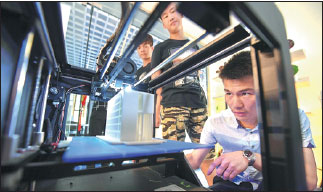Corporate leaders praise China's entrepreneurial spirit
By Fan Feifei (China Daily) Updated: 2017-06-10 07:13
|
|
Innovation is the key to success for China's young entrepreneurs, some of the biggest names in the global business world told an informal meeting in Beijing this week.
The heads of 18 leading multinational corporations praised the creativity that is flowing through the country's booming technology sector at a get-together in the Zhongguancun InnoWay area of the capital.
Chief executive officers, including Daimler AG's Dieter Zetsche, Schneider Electric SA's Jean-Pascal Tricoire and Dow Chemical's Andrew Liveris, talked openly about the challenges ahead and the "spirit of boldness".
Entrepreneurs, they pointed out, should concentrate on one area, and not be afraid of failure or of taking risks to eventually reach their goals.
"We have seen that young entrepreneurs in China are well-educated, willing to take risks and passionate about technology," said Tricoire, of Schneider Electric, a global energy management and automation conglomerate based in France.
Two young entrepreneurs that attended the private gathering felt that government policies had helped create an innovative environment in the country.
"We have very talented people here, our universities are excellent and venture capitalists are willing to fund tech startups," said Zhang Yao, who founded RoboTerra Inc, a company that develops robotic kits.
But Yao stressed that rising costs are becoming a problem, particularly in Beijing.
"The cost of entrepreneurship is relatively high in Beijing when you take into account rising rents and staff salaries," Yao said.
Tax breaks should also be considered, according to Han Yusheng, who runs gene technology firm Burning Rock in Beijing. "One of my biggest challenges comes from value-added tax," Han said.
In an effort to improve the competitive climate, the central government has rolled out measures to help startups.
On Wednesday, China's Ministry of Finance announced that small businesses with an annual taxable income of no more than 500,000 yuan ($73,599) would be eligible for tax breaks. The previous limit was 300,000 yuan.
This should help stimulate growth in the sector at key centers such as Zhongguancun Science Park, which is known as "China's Silicon Valley".
This sprawling tech park has become a hub of innovation and has attracted an army of entrepreneurs and startups.
"Young Chinese entrepreneurs often have an international educational background and work experience abroad," said Zeng Xiaodong, managing director of international operations on the Zhongguancun Science Park administrative committee.
"They have a global vision, and are able to master and apply the latest technologies to satisfy domestic consumption demand."
Entrepreneurs are certainly playing their part in helping to expand China's economy.
Data announced in March showed that the number of national high-tech industrial zones in the country had increased to 156 last year, with operating revenue hitting 27.9 trillion yuan.
The high-tech zones accounted for 11.7 percent of China's GDP in 2016 and 18 percent of China's total exports, according to Zhang Zhihong, director of Torch High Technology Industry Development Center at the Ministry of Science and Technology.
fanfeifei@chinadaily.com.cn
- 'Cooperation is complementary'
- Worldwide manhunt nets 50th fugitive
- China-Japan meet seeks cooperation
- Agency ensuring natural gas supply
- Global manhunt sees China catch its 50th fugitive
- Call for 'Red Boat Spirit' a noble goal, official says
- China 'open to world' of foreign talent
- Free trade studies agreed on as Li meets with Canadian PM Trudeau
- Emojis on austerity rules from top anti-graft authority go viral
- Xi: All aboard internet express












